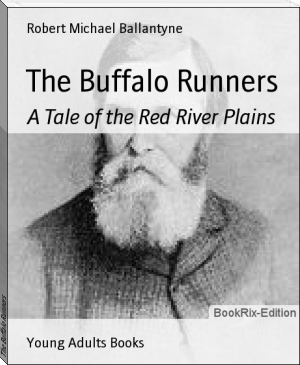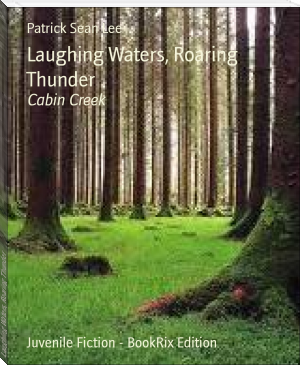The Buffalo Runners by Robert Michael Ballantyne (i can read book club .txt) 📖

- Author: Robert Michael Ballantyne
Book online «The Buffalo Runners by Robert Michael Ballantyne (i can read book club .txt) 📖». Author Robert Michael Ballantyne
CHAPTER THIRTY ONE.
RETRIBUTION.
Owing to the success of the buffalo runners, the winter passed away in comparative comfort. But, as we have said, some of the settlers who had been ruined by the failure of the fisheries and the depredations of the mice, and who did not share much in the profits of the autumn hunt, were obliged once again to seek their old port of refuge at Pembina.
Among these was the Swiss family Morel. Andre went, because he did not wish to remain comparatively idle in the colony during the long months of winter. Elise went for the purpose of keeping house--perhaps we should say keeping hut--for Andre. Fred Jenkins went because he wanted to learn more about Indian ways and customs, as well as to perfect himself in the art of hunting the buffalo--that was all!
There were some who did not believe what the bold seaman said. Elise Morel was one of these--perhaps the most unbelieving amongst them.
Indeed, she laughed quite hilariously when his motive was reported to her by Billie Sinclair the day before they started.
"Why do you laugh so?" inquired Little Bill, who was always more or less in a state of surprise when he got upon this subject with Elise.
"It is not easy to say, Billie," answered the girl, with another pleasant little laugh, "but it is so funny that a sailor should take such a fancy to come out here, so far away from his native element, and find so much interest in snow-shoe walking and Indian customs."
"Yes, isn't it?" responded the boy, "and him such a fine big man, too, who has gone through so much, and seen so many lands, and been in such a lot o' fights with pirates, and all that kind of thing. I can't understand him at all. I wish I understood him better, for I like him very much. Don't you?"
Elise was so much taken up with what she was doing at the time that she could not answer the question, and Billie was in such a wandering state of mind that he neglected to press it!
Daniel Davidson also went to Pembina that winter, because he could not bear to press the subject of his marriage just after the destruction of his and old McKay's crops by mice--a disaster which told rather heavily on both families. When winter had passed away, he, along with many others, returned to the colony and made preparations for going out to the plains for the spring hunt with the buffalo runners.
"You will better not be goin' wi' them," said Duncan McKay senior to his younger son, some days before the hunters had arranged to set out. "It will not be safe after your trial, for the half-breeds are mad at you, Tuncan."
If the old man had been wise enough to have left his son alone, Duncan junior would probably have remained where he was; but the mere offer of advice roused in him the spirit of opposition, and that reference to the half-breeds decided him.
"If all the half-breeds in Rud River wass to go as mad as buffalo-bulls wi' their tails cut off, I would go," said Duncan junior, with quiet decision of tone and manner, as he lighted his pipe.
"Ay, it iss that same you would do if you wass to be hanged to-morrow for doin' it, Tuncan," returned the old man testily, as he fired cloudlets in rapid succession from his compressed lips.
Duncan junior was equally firm in replying to his sister's remonstrances later in the day.
"You know, dear Duncan," she said, "that, although I believe you to be quite innocent, most of the half-breeds are of the opposite opinion, and some of them are very revengeful, especially when they think they have been deceived or unjustly treated."
"I do not fear the half-breeds," replied the youth gruffly.
"Of course you don't, Duncan, but you know that, though most of them are good, trusty men, some are mean fellows, who would not hesitate to shoot you in the smoke and confusion of the hunt. Do give up the idea, for my sake, dear."
"I would do much for your sake, Elspie, but not this, for it iss showin' the white feather I am, they will be sayin', and, as father often says, that iss what must never be true of a McKay."
Accordingly, Duncan junior mounted his horse, and accompanied Dan, Peter, Fergus, Okematan, Morel, Jenkins, and others to the plains, where they found that the main body of the hunters, under Antoine Dechamp, had arrived just before them. Kateegoose was also there, and La Certe, who once more tried his fortune at the chase under all the advantages of a new cart and horse, a new gun, and a new outfit--all received on credit--to be paid for by the proceeds of the chase, as the creditors, hoping against hope, tried to believe; never to be paid for at all, as the easy-going La Certe more than half suspected--though he was far too honest a man to admit that even to himself.
Of course, Slowfoot was with him--amiable, meek, and silent as ever. And so was Baby La Certe, a five-year-old by that time, and obviously a girl with a stronger penchant than ever for tobacco!
"The buffalo have been found already," said Dechamp to Dan Davidson, as the latter rode into camp at the head of his party. "Bourassin has just come in with the report that they are in great numbers away to the nor'-west, so we will make a fair start first thing in the morning."
As he spoke, Dechamp glanced with evident surprise at Duncan McKay.
"Why did you let him come?" he said in an under-tone to Dan, as they were tying up the horses.
"How could I prevent him?" replied Dan.
Next morning all was bustle, eager expectation, and lively conversation in the camp. Archie was there again, promoted to the condition of a full-fledged hunter by the possession of a gun. Little Bill was there also. He had improved so much in health and strength that he was permitted to ride with the runners on a pony; but was to content himself with viewing the battle from afar--that is, well in rear.
"Now, Little Bill," said Archie, with the seriousness of a grandfather, as they galloped with the hunters over the rolling plains, across which were streaming the first beams of the rising sun, "you must promise me to keep well in rear, and on no account to join in the chase. It's of no use to go in without a gun, you know, and there is great risk when in the thick of it, that you may come across a bullet or two. You'll have all the fun without the danger, Little Bill."
"All right, old boy; I'll do my best."
"Hallo, Archie!" cried Jenkins, galloping up alongside, with the blunderbuss in his left hand, "I've bin lookin' for you, lad. It's not easy to spy out a friend in such a shoal o' queer craft. Are 'ee goin' to sail alongside o' me this bout?"
"Of course I am, Fred. A man that can steer his way by compass over such a sea o' grass is worth holding on to."
"Well, then, heave ahead. We'll hunt in couples. I see they're gettin' into line o' battle, which means that the enemy's in view."
The sailor was right. Buffalo were seen grazing in the far distance, and the cavalcade was getting into line so as to advance in good order.
As on a former occasion, they approached at a slow pace until the animals began to lift their heads and throw inquiring glances in the direction from which the mounted host came. Then the word was given to trot, and, finally, to charge.
The rush on this occasion was even more tremendous than on the former, for there were considerably more men, and a larger herd of buffalo.
The lumbering heavy gait of the latter at the first start did not suggest the racing speed to which the clumsy creatures attained when they were hard pressed. Soon the dropping shots of the fast riders swelled into the rattling musketry of the real fight, and ere long the plain became strewed with dead and wounded animals, while smoke and dust obscured the air.
There was no order maintained after the first onset. Every man seemed to fight for his own hand. Crossing and re-crossing and firing recklessly in all directions, it seemed a very miracle that no fatal accidents occurred. Minor ones there were. Archie and his nautical comrade witnessed a few of these.
"I say, look at Bourassin!" exclaimed the former, pointing to the left with his nose--both hands being fully engaged with gun and bridle.
The seaman's eye turned in the direction indicated, and he beheld Bourassin's horse stopped by the hairy forehead of a buffalo-bull, while Bourassin himself was in the act of describing a magnificent parabolic curve over the buffalo's back. He alighted on his back, fortunately on a low bush, a yard or two beyond the buffalo's tail.
"Killed!" exclaimed Jenkins, anxiously, as he turned his horse in the direction of the fallen man.
But the seaman was wrong. The hunter did indeed lie flat and motionless for a few seconds--which was just as well, for it gave the bull time to toss off the horse, turn, and leap over the prostrate man in continuing its flight; but in another moment Bourassin was on his feet, soon caught his trembling horse, remounted, and continued the chase.
A little further on they saw Peter Davidson's horse put his foot in a badger-hole, the result of which was that the horse rolled over in one direction, while the expert Peter, tumbling cleverly to one side, rolled away in another direction like a Catherine-wheel. Both horse and man arose unhurt, and, like Bourassin, continued the chase.
"Necks ain't easy broke in this here country," remarked the seaman, as Archie pushed past him in pursuit of a fat young cow.
"Not often. Necks are tough, you see, and ground is mostly soft," cried Archie, as he fired and dropped the cow.
"Who's that away to the right, ridin' like a madman after a calf?" asked Jenkins, overtaking Archie, who was recharging his gun at the gallop.
"Who--where?" cried the boy, looking impatiently round.
"Keep cool, lad! Whatever condition you chance to be in, whether of danger or safety, always keep cool. For why?--it makes you comfortable, or more fit for action, as the case may be. See, the fellow over there half-hidden by smoke."
"Why, that's Duncan McKay. You might know him by his hat."
"I ain't a good judge o' hats," remarked the seaman, as he fired at a bull and missed it. "Ha! that comes o' firin' at





Comments (0)